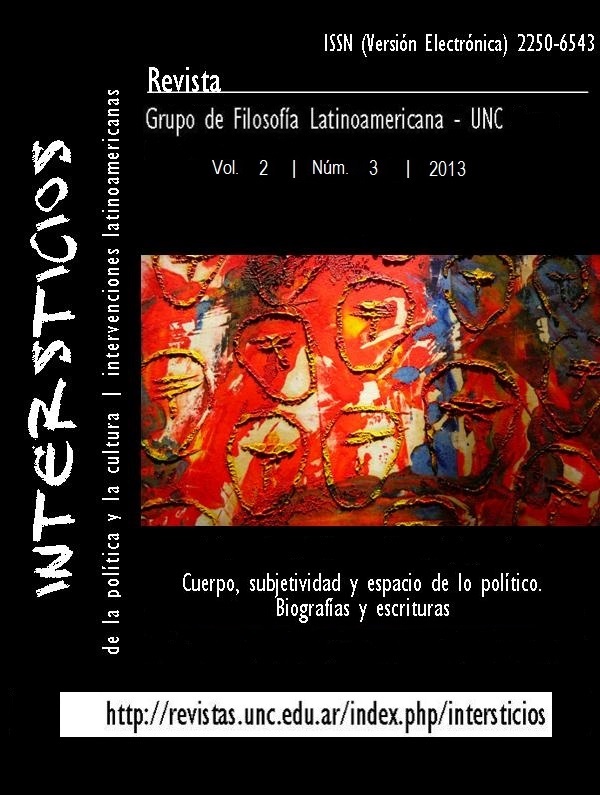RETÓRICAS DEL CUERPO Y LA CULTURA: MEMORIA Y POLÍTICA EN NOVELAS DE LOS '90
Abstract
Resumen
En este trabajo buscamos explicitar algunos conceptos que permitan pensar el funcionamiento de las novelas en tanto textos artísticos insertos en contextos culturales específicos. Elegimos para esta labor dos obras de autores latinoamericanos que escriben ficciones a comienzos de la década del ’90, cada una de ellas tematiza la frontera intercultural indígena/occidental pasada/presente. Específicamente, abordaremos Maldita yo entre las mujeres (1991) de la escritora chilena Mercedes Valdivieso y Lituma en los Andes (1993) del autor peruano Mario Vargas Llosa. Consideramos que en estas obras puede observarse una triple modelización del mundo dada por el cuerpo, la lengua y la cultura de manera tal que un nivel influye en el otro produciendo modelos de memorias y de subjetividades. Desde nuestro punto de vista, la Retórica es entendida como un mecanismo de funcionamiento textual/cultural que permite la articulación de zonas informativas que en principio eran intraducibles entre sí. La creación de información emana de esa rearticulación o traducción de datos ya dados, y es en ese margen limitado de acción-elección-creación donde radica la responsabilidad ética del autor ante un público lector. En tal sentido, nos interesa pensar las posibilidades de postular una Retórica del Cuerpo y la Cultura que permita ahondar en la dinámica artística y política de la novela en América Latina.
Palabras clave: novela – retórica - cultura
Abstract
In this work we propose some concepts that allow us to think the functioning of novels, like artistic texts inserted in specific contexts. We choose in this opportunity two works by Latin American authors who write fiction in the early 90s. The topic in these novels is border intercultural indigenous/Western past/present. Specifically, I will study Maldita yo entre las mujeres (1991) by Chilean writer, Mercedes Valdivieso, and Lituma en los Andes (1993) by Peruvian author Mario Vargas Llosa. We believe that these works can be studied in a triple modelization that involves body, language and culture, in the way that one level influences the others producing memories and subjectivities. From our point of view, Rhetoric is understood as a mechanism of textual/cultural functioning that permit the author join different informative zones of information from the culture. The action of the author in relation to chose and re-enact information links his work with ethical and political aspects. We propose that Rhetoric of Body and Culture, hypothetically, allow us to research artistic and politic dynamics in the gender of novel in the Americas.
Key words: novel – rhetoric - culture
Downloads
Downloads
Published
Issue
Section
License
Authors who have publications with this journal agree to the following terms:
a. Authors will retain their copyright and grant the journal the right of first publication of their work, which will simultaneously be subject to the Creative Commons Attribution License that allows third parties to share the work as long as its author and first publication in this journal are indicated.
b. Authors may adopt other non-exclusive license agreements for distribution of the published version of the work (e.g., deposit it in an institutional telematic archive or publish it in a monographic volume) as long as the initial publication in this journal is indicated.
c. Authors are allowed and encouraged to disseminate their work through the Internet (e.g., in institutional telematic archives or on their web page) after the publication process, which may produce interesting exchanges and increase citations of the published work (see The effect of open access).


